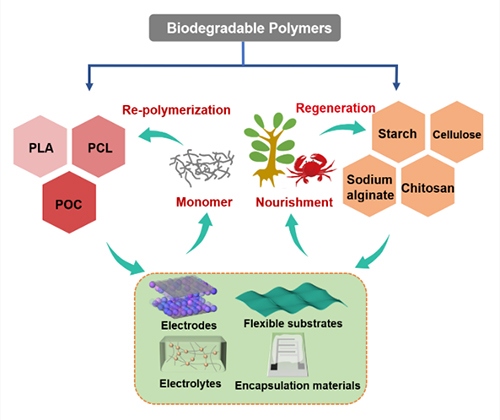Polymers with their rich diversity, outstanding flexibility, and good processability can effectively enhance the functionality of supercapacitors (SCs) and expand their practical applications. Currently, polymer materials used in SCs are non-biodegradable, posing threats to the environment. Recently, a research team led by Prof. WU Zhong-Shuai from the Dalian Institute of Chemical Physics (DICP) of the Chinese Academy of Sciences (CAS) clarified the importance of biodegradable polymers, a component of future green SCs.
Their review article was published in Advanced Functional Materials on Feb. 8.

Biodegradable polymers in supercapacitors and the recycling process (Image by WU Lu)
"A green SC requires good biodegradability of different components to achieve harmless disposal in various environments," said Prof. WU. "To meed these requirements, the device preparation must be highly dependent on the application of biodegradable polymers and innovative design strategies."
The researchers summarized the classification of existing biodegradable polymers and their typical structure, properties, and preparation processes, as well as the main applications of biodegradable polymers in different components of SCs, including electrodes, electrolytes, substrate, and encapsulation materials.
They also discussed the research progress of biodegradable polymer-based SCs in terms of preparation strategies and modification methods, as well as the key role of biodegradable polymers in the development process of green SCs.
Moreover, they briefly proposed the future perspectives and challenges faced by biodegradable polymer-based SCs.
"Biodegradable polymers are the ideal raw material, and suitable research strategies and preparation methods are powerful means to realize environment-friendly treatment of supercapacitors" said Prof. WU.
The above work was supported by the National Natural Science Foundation of China and the China Postdoctoral Science Foundation.